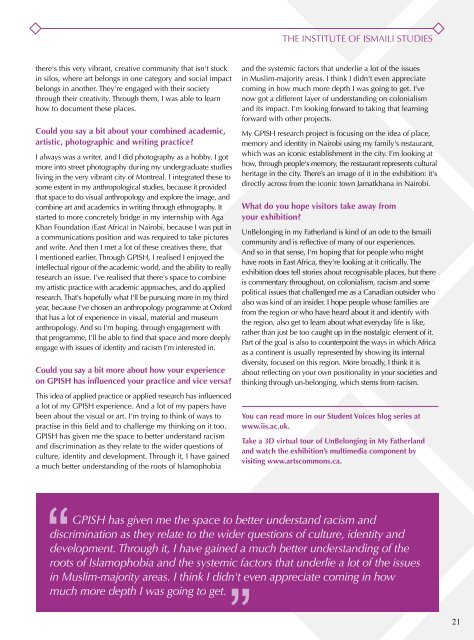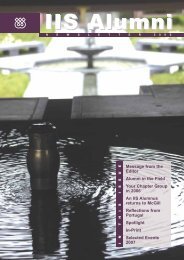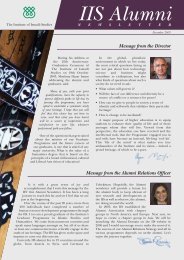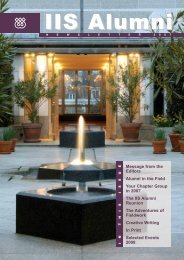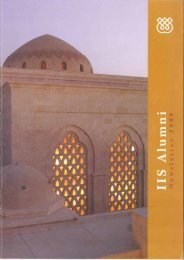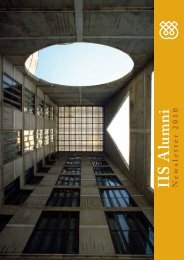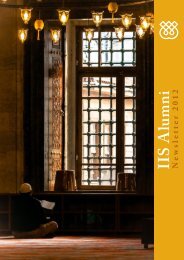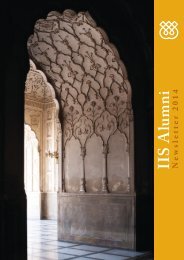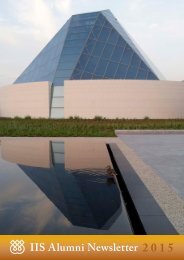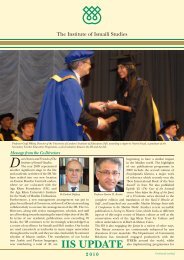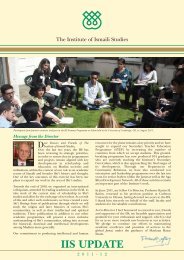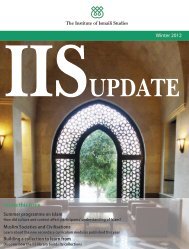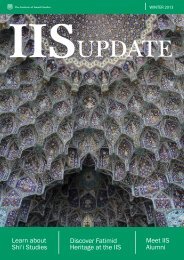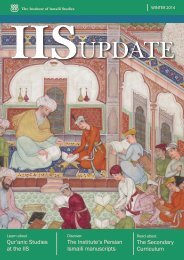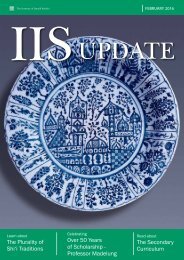IIS UPDATE Magazine Edition 20
You also want an ePaper? Increase the reach of your titles
YUMPU automatically turns print PDFs into web optimized ePapers that Google loves.
THE INSTITUTE OF ISMAILI STUDIES<br />
there's this very vibrant, creative community that isn't stuck<br />
in silos, where art belongs in one category and social impact<br />
belongs in another. They're engaged with their society<br />
through their creativity. Through them, I was able to learn<br />
how to document these places.<br />
Could you say a bit about your combined academic,<br />
artistic, photographic and writing practice?<br />
I always was a writer, and I did photography as a hobby. I got<br />
more into street photography during my undergraduate studies<br />
living in the very vibrant city of Montreal. I integrated these to<br />
some extent in my anthropological studies, because it provided<br />
that space to do visual anthropology and explore the image, and<br />
combine art and academics in writing through ethnography. It<br />
started to more concretely bridge in my internship with Aga<br />
Khan Foundation (East Africa) in Nairobi, because I was put in<br />
a communications position and was required to take pictures<br />
and write. And then I met a lot of these creatives there, that<br />
I mentioned earlier. Through GPISH, I realised I enjoyed the<br />
intellectual rigour of the academic world, and the ability to really<br />
research an issue. I've realised that there's space to combine<br />
my artistic practice with academic approaches, and do applied<br />
research. That's hopefully what I'll be pursuing more in my third<br />
year, because I've chosen an anthropology programme at Oxford<br />
that has a lot of experience in visual, material and museum<br />
anthropology. And so I'm hoping, through engagement with<br />
that programme, I'll be able to find that space and more deeply<br />
engage with issues of identity and racism I’m interested in.<br />
Could you say a bit more about how your experience<br />
on GPISH has influenced your practice and vice versa?<br />
This idea of applied practice or applied research has influenced<br />
a lot of my GPISH experience. And a lot of my papers have<br />
been about the visual or art. I'm trying to think of ways to<br />
practise in this field and to challenge my thinking on it too.<br />
GPISH has given me the space to better understand racism<br />
and discrimination as they relate to the wider questions of<br />
culture, identity and development. Through it, I have gained<br />
a much better understanding of the roots of Islamophobia<br />
and the systemic factors that underlie a lot of the issues<br />
in Muslim-majority areas. I think I didn't even appreciate<br />
coming in how much more depth I was going to get. I’ve<br />
now got a different layer of understanding on colonialism<br />
and its impact. I'm looking forward to taking that learning<br />
forward with other projects.<br />
My GPISH research project is focusing on the idea of place,<br />
memory and identity in Nairobi using my family's restaurant,<br />
which was an iconic establishment in the city. I’m looking at<br />
how, through people's memory, the restaurant represents cultural<br />
heritage in the city. There’s an image of it in the exhibition: it's<br />
directly across from the iconic town Jamatkhana in Nairobi.<br />
What do you hope visitors take away from<br />
your exhibition?<br />
UnBelonging in my Fatherland is kind of an ode to the Ismaili<br />
community and is reflective of many of our experiences.<br />
And so in that sense, I'm hoping that for people who might<br />
have roots in East Africa, they're looking at it critically. The<br />
exhibition does tell stories about recognisable places, but there<br />
is commentary throughout, on colonialism, racism and some<br />
political issues that challenged me as a Canadian outsider who<br />
also was kind of an insider. I hope people whose families are<br />
from the region or who have heard about it and identify with<br />
the region, also get to learn about what everyday life is like,<br />
rather than just be too caught up in the nostalgic element of it.<br />
Part of the goal is also to counterpoint the ways in which Africa<br />
as a continent is usually represented by showing its internal<br />
diversity, focused on this region. More broadly, I think it is<br />
about reflecting on your own positionality in your societies and<br />
thinking through un-belonging, which stems from racism.<br />
You can read more in our Student Voices blog series at<br />
www.iis.ac.uk.<br />
Take a 3D virtual tour of UnBelonging in My Fatherland<br />
and watch the exhibition’s multimedia component by<br />
visiting www.artscommons.ca.<br />
GPISH has given me the space to better understand racism and<br />
discrimination as they relate to the wider questions of culture, identity and<br />
development. Through it, I have gained a much better understanding of the<br />
roots of Islamophobia and the systemic factors that underlie a lot of the issues<br />
in Muslim-majority areas. I think I didn't even appreciate coming in how<br />
much more depth I was going to get.<br />
21


